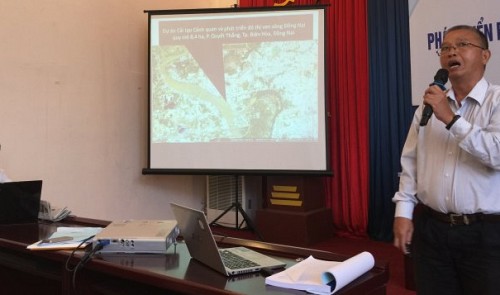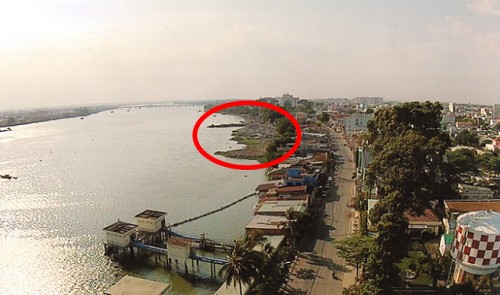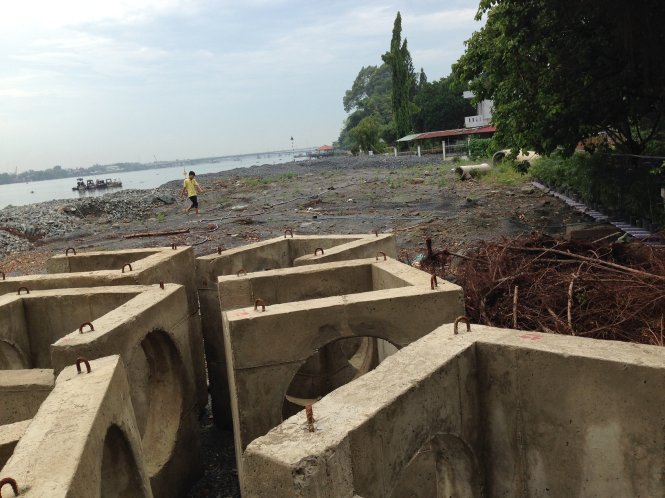River-encroaching project in southern Vietnam should be scrapped as it breaks laws: experts

The demand was pressed at a seminar on sustainable development in river basins that was jointly held on Tuesday by the Vietnam Union of Science and Technology Associations and the Institute of Legislative Studies (ILS) under the Vietnamese National Assembly.
At the event, experts expressed trenchant criticisms of a multimillion-dollar project regarding its violation of many laws and the potential adverse impacts on the environment, even though the developer has suspended it.
The implementation of the Pegasus Residence project in Dong Nai Province was approved by the local People’s Committee in May 2014.
Toan Thinh Phat Investment Architecture and Construction Joint Stock Company is the developer of the project, estimated to cost VND3.2 trillion (US$147.2 million).
Toan Thinh Phat had reclaimed a certain area of land from the river when it decided to halt the project given harsh condemnation from the public.
This project has been set up irrationally and shown lawbreaking signs, the Voice of Ho Chi Minh City quoted Dr. Vu Ngoc Long, head of the Southern Ecological Institute, as saying.
Long said that the project has flouted the Law on Water Resources as it attempts to put barricades in the river, build architectural works in it, and plant trees that cause obstruction to drainage and water flows.
 The red ring in this image shows a site along the bank of the Dong Nai River in the southern Vietnamese province of Dong Nai, where Toan Thinh Phat Investment Architecture and Construction JSC plans to build a multimillion-dollar residential area by reclaiming land from the river. Photo: Tuoi Tre The red ring in this image shows a site along the bank of the Dong Nai River in the southern Vietnamese province of Dong Nai, where Toan Thinh Phat Investment Architecture and Construction JSC plans to build a multimillion-dollar residential area by reclaiming land from the river. Photo: Tuoi Tre |
The project also infringes the Law on Environmental Protection, Law on Disaster Prevention and Control, and Law on Inland Waterway Traffic, the scientist said, without giving details.
Some people have requested Pegasus Residence’s environmental impact assessment report be re-written but once the project has violated many laws, such re-writing is meaningless, Dr. Long said.
“The only remedy would be stopping it and removing all the soil and rock the constructor has poured into the river to reclaim land,” he said.
Of 8.4 hectares in the project’s total area, 91 percent would be created by encroaching on the Dong Nai River, the scientist added.
Dinh Xuan Thao, head of the ILS, also affirmed that the project has breached a number of laws. Thao agreed with Dr. Long that the project should be scrapped.
When the project was kicked off, it faced serious objections from many experts who warned about the bad impacts it would have on the environment and people who live along the areas through which the Dong Nai River runs.
The river is 586km in length – considered the longest in Vietnam – and flows through Lam Dong and Dak Nong Provinces in the Central Highlands, and Binh Phuoc Province, Dong Nai Province, Binh Duong Province, and Ho Chi Minh City in the southern region.
Given such opposition, on March 27 Toan Thinh Phat asked the provincial People’s Committee for the suspension of the project.
Last month, a joint inspection team from the four ministries: Natural Resources and Environment; Agriculture and Rural Development; Construction; and Transport inspected the project, Dr. Long said, adding that he and many other experts are waiting for the team’s assessment of the legality of the project.
 An area belonging to the project to build a residential area and improve landscapes on the Dong Nai River in the southern province of Dong Nai is pictured on May 12, 2015. Photo: Tuoi Tre |
Unreliable environmental impact report with copied contents
Toan Thinh Phat has failed to point out all possible influences of the Pegasus Residence project and has not taken into account the feedback on it from scientists and the public, Dr. Long complained.
“The environmental impact assessment report just briefly presented the opinions of only 20 households living in the areas to be affected by the project,” Dr. Long said. “This report was prepared perfunctorily and lacks many essential facts and figures.”
Dr. Long pointed out that the actual aim of the project is to build an urban area in the river, not to build embankments along the riverbank as described in the project.
“The project developer says only 30 percent of the total area will be used for building houses, and the remaining will be for landscapes. But people will not be ready to buy these houses if they are not located in attractive locations. So the ultimate goal of the project is to build houses for sale,” Dr. Long affirmed.
After a working trip to the project’s area, a joint team from the four ministries has commented that the environmental impact assessment report is not reliable, Dr. Long said.
According to the scientist, a surveillance trip made in late March showed a huge amount of rock and soil had been poured into the river to reclaim land for the project.
Such reclamation would cause a major change to the river’s current, affect the structure of its bed, and have negative impacts on the residential areas nearby, he said.
Dr. Long also warned that this environmental impact report contains many items that are the same as those in another report, which was prepared for a project to build the Vinh Hang cemetery in Vinh Cuu District, also located in Dong Nai Province.
What the stars mean:
★ Poor ★ ★ Promising ★★★ Good ★★★★ Very good ★★★★★ Exceptional
Latest News
More News
- Congratulations from VFF Central Committee's int’l partners to 14th National Party Congress (January 25, 2026 | 09:46)
- List of newly-elected members of 14th Political Bureau announced (January 23, 2026 | 16:27)
- 14th Party Central Committee unanimously elects To Lam as General Secretary (January 23, 2026 | 16:22)
- List of members of 14th Party Central Committee announced (January 23, 2026 | 09:12)
- Highlights of fourth working day of 14th National Party Congress (January 23, 2026 | 09:06)
- Press provides timely, accurate coverage of 14th National Party Congress (January 22, 2026 | 09:49)
- Press release on second working day of 14th National Party Congress (January 22, 2026 | 09:19)
- Minister sets out key directions to promote intrinsic strength of Vietnamese culture (January 22, 2026 | 09:16)
- 14th National Party Congress: Renewed momentum for OVs to contribute to homeland (January 21, 2026 | 09:49)
- Party Congress building momentum for a new era of national growth (January 20, 2026 | 15:00)
















 Mobile Version
Mobile Version